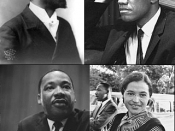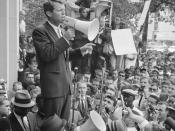The human race has almost never adjusted to change well. Humanity, for the most part, has always had difficulty viewing 'others' as equals; this is especially true in dealing with those of a different race. In the early twentieth century, amidst all the change taking place because of the industrial revolution, many leaders of the African American community in the United States began to talk of, what seemed to some, radical ideals of equality of the races. One such voice was that of W.E.B. Du Bois. Considered one of the more radical African Americans of his time Du Bois was instrumental in the early civil rights movement in this nation, including helping establish the NAACP. In this book, The Souls of Black Folk, Du Bois suggests that the time for complacency has gone and those like Booker T. Washington calling for assimilation were outdated. Du Bois asserts that no man, regardless of race or nationality, should have to beg or fight for the basic human rights and common opportunities in education and all other facets of life that naturally belong to all mankind equally.
Du Bois also believes that steps must be taken to ensure a better way of live and protect the good and the true things for future generations.
During the late nineteenth century there were two strong voices in the African American community, those of Booker T. Washington and W.E.B. Du Bois, and the two could not have been more dissimilar from each other. Washington was what Du Bois called compromising in his fight for some type of civil rights for the African American. Washington simply believed that if the African American population would merely accept their position in society as it was eventually change would come. Instead of working for more political rights or...


